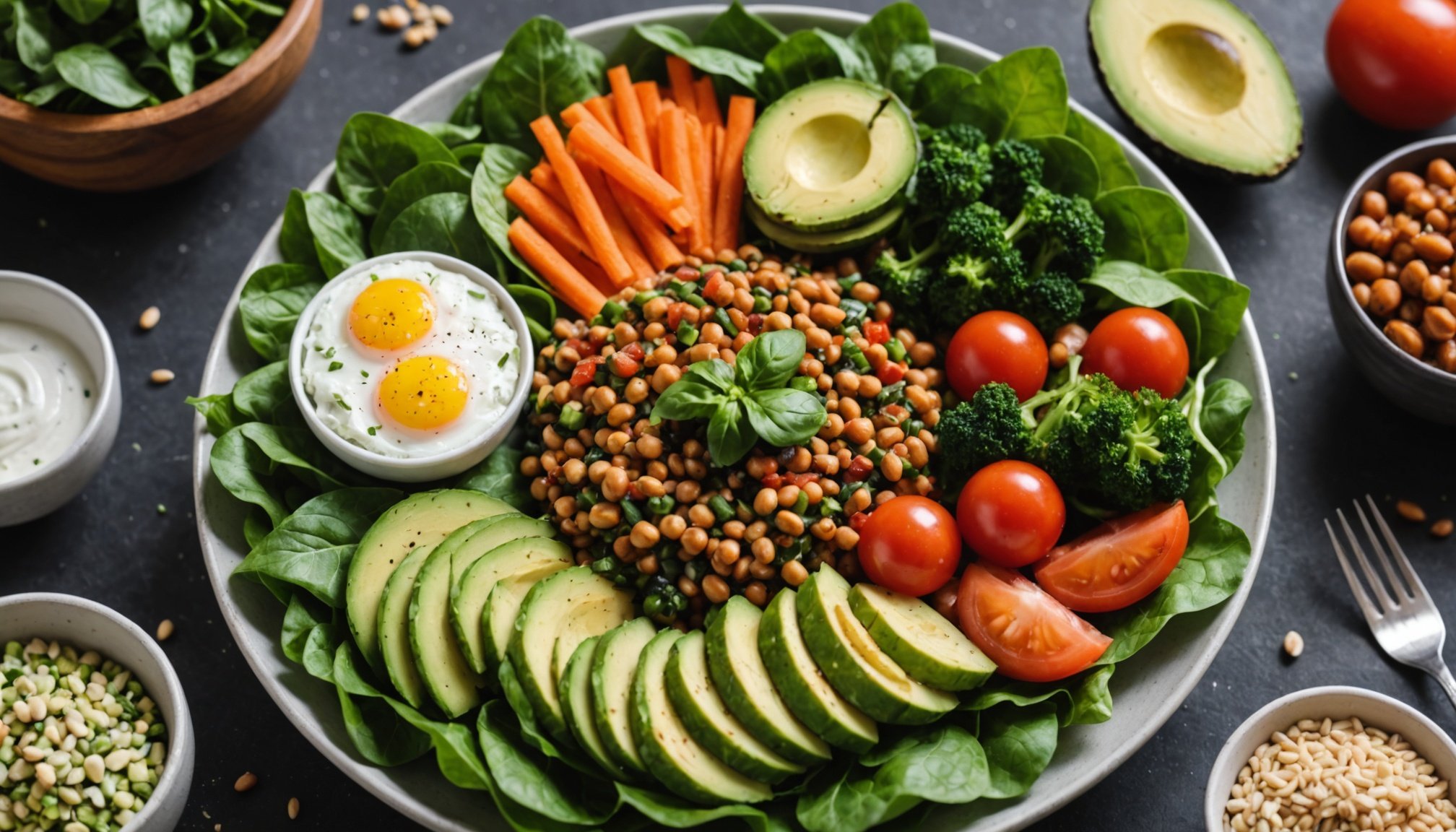Understanding a Plant-Based Diet
A plant-based diet primarily includes foods derived from plants, incorporating fruits, vegetables, whole grains, nuts, seeds, and legumes. Unlike strict vegan or vegetarian regimens, it may occasionally allow for small amounts of animal products. The primary focus is on increasing plant consumption, which can profoundly impact overall health and wellbeing.
When examining the benefits of plant-based eating, numerous studies suggest improvements in cardiovascular health, weight management, and diabetes prevention. Plant-based diets typically offer high levels of essential nutrients, fibre, antioxidants, and healthy fats, which contribute to lower cholesterol, better digestive health, and reduced inflammation.
Have you seen this : Combatting the Heart Risks of Prolonged Sitting: Effective Strategies for Prevention
Misconceptions surrounding plant-based diets often revolve around perceived nutritional inadequacies, particularly regarding protein and certain vitamins. However, with careful planning and awareness, individuals can meet their nutrient needs.
Key dietary guidelines to ensure balanced nutrition include consuming a variety of vegetables, integrating protein-rich plant foods like legumes and soy products, and considering fortified foods or supplements to address any potential deficiencies in B12, iron, or omega-3 fatty acids.
Also to discover : Unveiling the Pros and Cons of Smart Inhalers for Superior Asthma Management
Understanding these aspects can help demystify plant-based diets, enabling more individuals to reap their potential health benefits.
Getting Started with Plant-Based Eating
Beginning a plant-based diet can be both exciting and challenging. Approach it with patience and curiosity, especially when exploring beginner plant-based recipes. Incorporating these into your routine can spark creativity and satisfy diverse taste preferences.
Easy Plant-Based Meals
Kickstart your journey with five simple recipes:
- Chickpea stir-fry: Quick and packed with protein.
- Quinoa salad: A refreshing mix of grains and veggies.
- Lentil soup: Comforting, rich in fibre.
- Avocado toast: An ideal breakfast or snack.
- Stir-fried tofu with broccoli: A tasty nutrient boost.
These dishes require minimal preparation but deliver maximum flavour and nutrition.
Simple Snacks to Start With
Transition seamlessly by having readily available snacks:
- Fresh fruits or a mixed berry medley.
- Nuts like almonds or walnuts.
- Homemade granola bars.
- Carrot sticks or cucumber slices with hummus.
Essential Cooking Techniques
Begin by mastering easy techniques:
- Sautéing for veggie-based dishes.
- Roasting for intensified flavours.
- Blending for homemade smoothies.
To complement your meals, explore food substitutions such as swapping dairy milk with almond milk or using chickpeas instead of beef in traditional recipes. Such adaptations are simple yet effective pathways to thriving on a plant-based diet.
Meal Planning and Grocery Shopping
Creating an effective meal plan is essential for those adopting a plant-based diet. Start by identifying your dietary preferences and week-to-week needs. Incorporate a variety of grains, legumes, and vegetables to ensure balanced nutrition and prevent meal fatigue. A flexible plan allows for spontaneous cooking adventures or last-minute food inspiration while minimizing food waste.
Craft a detailed shopping list for a plant-based diet to streamline grocery trips and ensure you’re stocking essential pantry items. Foods like lentils, chickpeas, oats, and nuts are staples due to their versatility and nutritional value. Remember to include a mix of fresh and frozen vegetables to provide variety and convenience.
Finding budget-friendly plant-based options can make the dietary transition economical and sustainable. Purchase seasonal produce, which is often fresher and less expensive. Consider buying in bulk to save on grains and legumes. Plant-based proteins, though initially appearing costly, can be cost-efficient over time as they are versatile and used sparingly.
Incorporating these strategies into your daily routine simplifies meal preparation and reduces overall dietary costs, ensuring that adopting a plant-based lifestyle is both efficient and affordable. Whether you’re shopping weekly or monthly, these tips can help maintain a balanced, nutritious, and economically viable plant-based diet.
Nutritional Considerations
Embarking on a plant-based diet introduces a new way to experience nutrition, prioritizing essential nutrients that support overall health. To ensure a balanced plant-based nutrition profile, it’s crucial to focus on variety and mindful intake of key nutrients.
Essential Nutrients for Plant-Based Nutrition
A successful plant-based diet emphasizes nutrients like protein, iron, calcium, omega-3 fatty acids, and vitamin B12. Protein can be obtained from legumes, tofu, and soy products, while leafy greens, nuts, and seeds are beneficial sources of calcium and iron. Omega-3 fatty acids from chia seeds, flaxseeds, and walnuts are essential for maintaining heart health and cognitive function.
Ensuring an adequate intake of vitamin B12—commonly found in animal products—can be challenging. Thus, fortified foods or supplements for a plant-based diet become key for those deficient. Regular health check-ups aid in monitoring these vitamin levels and guiding necessary dietary adjustments.
Supplements for Plant-Based Diet
For some, obtaining all nutrients exclusively from food could be difficult, making some nutritional supplements beneficial. Multivitamins or specific supplements for B12, iron, or omega-3s can bridge potential gaps. Always consult healthcare professionals before starting any supplement regimen to tailor it to personal nutritional needs.
Continued education through resources like reputable dietary guides or nutritional courses further supports plant-based dietary success.
Overcoming Common Challenges
Adopting a plant-based diet comes with its unique set of challenges, yet these can be managed with strategic solutions. Challenges in plant-based diet primarily revolve around limited food choices and lack of meal variety. This can lead to food fatigue, where meals feel repetitive. To combat this, it’s crucial to explore diverse cuisines and experiment with new ingredients that keep meals exciting and delicious.
One major challenge is the potential nutritional deficiencies that may arise if the diet isn’t carefully planned. Solutions to dietary issues include ensuring a balanced intake of essential nutrients like protein, iron, and vitamins through careful dietary planning or incorporating supplements as needed.
Maintaining motivation can also be difficult, particularly during the transitional phase. Regularly setting new culinary goals or participating in plant-based cooking challenges can help sustain enthusiasm. Joining supportive online communities can provide encouragement and share practical insights, making the transition smoother.
Lastly, social situations might pose challenges, especially during gatherings with non-plant-based eaters. Developing a repertory of portable and appealing dishes to bring to events or practicing ways to confidently discuss and share the health benefits of a plant-based diet can foster a supportive environment. Staying informed and prepared is key to overcoming these common hurdles effortlessly.
Inspiring Success Stories
Embarking on a plant-based diet journey brings with it inspiring success stories that can fuel motivation and encourage lasting change. These narratives often highlight personal transformations and the profound impact dietary shifts can have on health and wellbeing.
For instance, many individuals report significant health improvements, such as weight loss, improved energy levels, and reduced chronic disease symptoms. These outcomes not only enhance quality of life but also demonstrate the tangible benefits of adopting a diet rich in fruits, vegetables, and whole grains.
Personal testimonials play a pivotal role in motivating others to embrace plant-based eating. They showcase real-life experiences and practical insights, offering relatable examples for newcomers. Hearing about someone who has navigated similar challenges and achieved health goals can be incredibly inspiring.
Building a supportive community is also crucial during this transition. Engaging with like-minded individuals through online forums or in-person meetups provides a platform for sharing recipes, tips, and encouragement. This camaraderie fosters a sense of belonging and collective motivation, making the journey more enjoyable and sustainable.
Ultimately, these motivational examples serve as a beacon of possibility, illustrating how plant-based eating can lead to remarkable personal transformations. By sharing and celebrating these success stories, others are encouraged to explore and commit to this rewarding dietary lifestyle.
Resources for Continued Learning
Embarking on a plant-based diet journey can be greatly enriched by accessing a variety of resources, enhancing both understanding and culinary skills. There is a wealth of plant-based diet resources available that cater to different learning styles and interests, from reading materials to interactive platforms.
- Books and Websites: A comprehensive selection of literature and online articles offer in-depth information and recipes. These resources provide critical dietary insights and practical tips for implementing a plant-based lifestyle effectively. Authors like Michael Greger and platforms such as Forks Over Knives are popular choices.
Structured education in the form of cooking classes and online courses can be valuable. These programs not only teach culinary techniques but also cover nutritional science, helping individuals make informed dietary choices. Participating in workshops can stimulate creativity and confidence in plant-based cooking.
Lastly, engaging with online communities offers a supportive network for those new to this lifestyle. Forums, social media groups, and meetups provide spaces where individuals can share experiences, seek advice, and find motivation. Interaction within such networks fosters a sense of belonging and collective learning, making the plant-based transition not only educational but also enjoyable.








